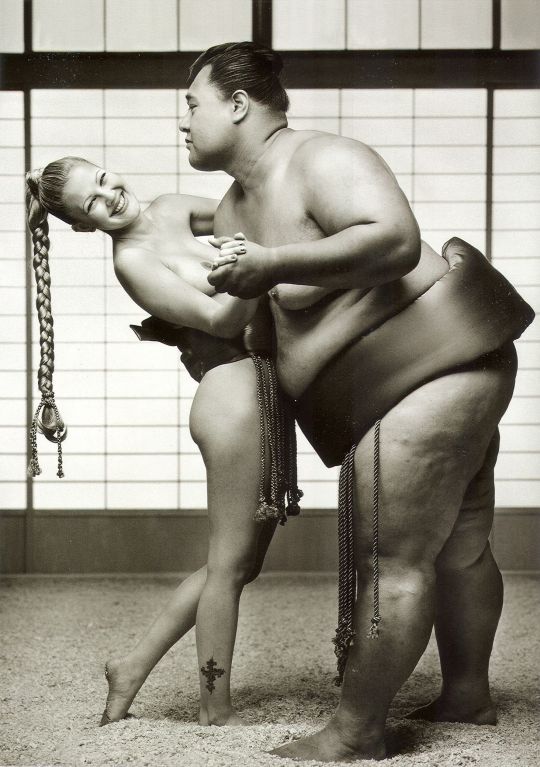#female archetype
Text

11 notes
·
View notes
Text
One major factor missing from most debates on Arya and Lyanna's beauty is that they're being judged by their society's extremely patriarchal values. In both looks and personality, that context is essential to understanding how others perceive them. George explores the misogyny experienced by non-conforming women, especially with Arya, and it's interesting how he plays with that regarding their physical beauty.
Her mother used to say she could be pretty if she would just wash and brush her hair and take more care with her dress, the way her sister did. (The Blind Girl, ADWD)
"You never knew Lyanna as I did, Robert," Ned told him. "You saw her beauty, but not the iron underneath. She would have told you that you have no business in the melee." (Eddard VII, AGOT)
These two quotes offer a nice summation of this idea. With Arya, her supposed lack of beauty is defined by her being a non-conforming wild child. Her hair is messy, her face is dirty, and she's often in "lower class" clothing while engaging in unladylike activities. None of this says anything about her physical beauty but it tells us everything about how she's perceived. Arya could be pretty...If she conforms to society's standards for a highborn Lady. With Lyanna, however, we get the opposite. Where Arya is judged based on her personality, Robert's romanticization of Lyanna is rooted solely in her looks. He doesn't know anything about the person she really was. There is an assumption that, because she looked a certain way, her personality must fit and Robert imagines her much softer and more passive than she actually was.
That Arya isn't pretty or Lyanna wasn't wild are two perceptions that George specifically pushes back against. This is where people miss the brilliance of them being linked as literary mirrors; it is largely about us learning more about Lyanna, but it touches on more than that. The significance of them being written as wild, willful, and with their own beauty is that George isn't writing his female characters around patriarchal expectations. When people debate their beauty, that's often the trapping they fall into. Beauty and non-conformity are treated as mutually exclusive factors when the story itself never makes that point; this is also the logic that leads people to the (incorrect) conclusion that Lyanna and Arya aren't meant to be similar. Arya's self-esteem issues around her looks and being a Lady make this a topic certain to be addressed in the future; George has made it a part of the story. The conclusion shouldn't be that "looks don't matter", but that looks aren't indicative of a character's value, personality, or morality.
#arya stark#lyanna stark#asoiaf#valyrianscrolls#I know we're tired of this topic but I'm going to keep bringing it up until people base their analysis on what's actually in the books#it's not about needing/wanting Arya to be pretty it's about! the story being told#and it's just frustrating that this is such a highly debated topic that lacks all the nuance it's handled with in the source material#among a lot of other reasons people miss this point because they miss the way misogyny is handled in Arya's chapters#they think her being non-conforming mean she has some super special privilege that makes her exempt from it#Arya being pretty is a relatively small part her character but the message behind it contributes to a larger picture#and the biggest shame about this whole debate is that it misses genuinely brilliant writing#it's just absurd to be that /female character being non-conforming and pretty/ is beyond this fandom's comprehension skills#you guys really just want to force them into being flat no-nuance archetypes for easier consumption#Arya and Lyanna...I'm so sorry this fandom can't handle you because they hate women#mind you several people refer to Arya as pretty but apparently every single one of them is lying/unreliable because...reasons#this fandom truly has zero comprehension skills
60 notes
·
View notes
Text
i hope ruby gets a well-that’s-alright-then-style notdeath. on the one hand it will make haters mad because oh no not another companion with an impermanent end (and i like to see haters mad) on the other it would require creativity to depict this in a new way + i love all the implications i love the dark fairytale quality of these companion exits i love my un-undead schrodinger’s women
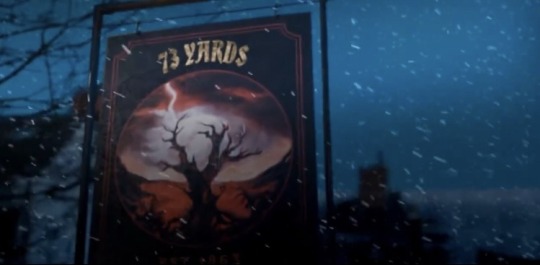

with the way the legend of ruby sunday is titled… legends aren’t usually told about living people. legends are stories of the bygone past, of an age long since over, fictionalised and overgrown with folklore like barnacles sticking to an abandoned shell. there is such a thing as a living legend, but they’re exceedingly rare. the unmistakeable raven’s call in the 73 yards teaser, the trailer’s cut to fifteen crying alone after promising to cherry he’d protect her daughter… the foreshadowing is clear as day…
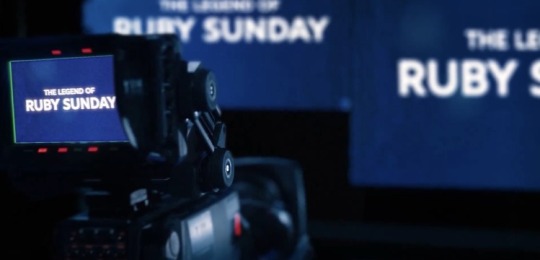
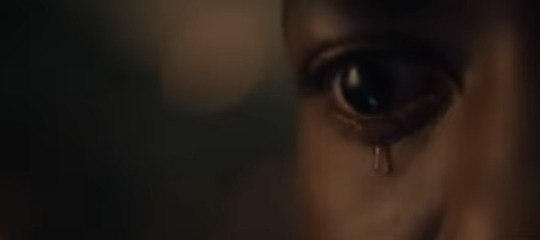
and yet. there’s one massive HOWEVER. ruby appears in s15: millie’s been spotted on set filming it. which leads me to believe — the doctor isn’t one to take the time travel route and revisit companions that in his future are genuinely dead. that would hurt too much, it would cause unnecessary trauma and could break the timeline. that must mean ruby stays alive in some way. ish. she’s alive and a legend and a mystery. girl-ballad girl-song girl-paradox

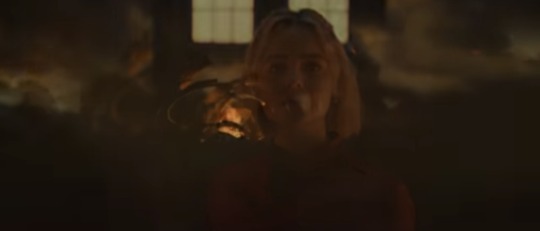
here she is, fading out.
p.s.: thesis statement on moffatgirls from the tags i left on somebody else’s post about charley pollard.. well it belongs here since it’s basically the semiotic hurricane swirling around ruby at the moment :)

#on a personal level what interests me about these characters is precisely what gets them labeled as being subject to#misogynistic writing by pop-feminist video-essayists. as an autistic girl* (*ish) however; i find female characters that#aren’t quite ‘normal people’; women who represent an idea or concept or are a puzzle to be solved or a manic pixie dream girl to be#more and in a way far more interesting than a girl-next-door-type universally relatable protagonist#they make for more nuanced stories with more symbolism and more layers of interpretation usually. why should there be realism in a#fantastical narrative? similarly i like characters that are haunting the narrative or dead before it began (big locked tomb fan if you#didn’t know) and like. not to be tvtropes but the lost lenore archetype. dead woman who spurs the hero on to recklessness or revenge.#i identify with that dead girl. the laura palmers of the world. set the story in motion without#necessarily having agency. maybe it’s something to do with my#constant background radiation of passive suicidality. in a fun whimsical way :) i would never kill myself but i don’t want to be a real#person. i want to be objectified but not necessarily in a k*nky s*xual way (that too) in a princess in a tower way#the ultimate femme fantasy innit? there’s something about it. hashtag problematic hashtag conforming to gender roles#10000 tags be upon ye#ruby sunday#millie gibson#doctor who#dw#steven moffat#clara oswald#fifteen#fifteenth doctor#twelveclara#amy pond#charley pollard#river song#donna noble#ncuti gatwa#doctor who meta#jamie.txt#haunting
63 notes
·
View notes
Text
One element in Ed’s characterization that might be interesting to look at is him being related to the “fallen woman” archetype we see in a lot of romantic dramas and some comedies—the woman who is defined by her past (usually sexual, but sometimes not) and whom both the narrative and the male lead must either save or condemn.
This female archetype usually has two fates: she sacrifices herself for the good man, paving the way for him to join with the good woman (so Ed trying to take the blame for Nigel’s murder to save Stede, Ed getting between Stede and the firing squad), or the good man forgives her for her past and declares his love for her.

OFMD belies both of these. Ed does not actually sacrifice himself for Stede, and Stede does not "forgive" Ed for his past because there is nothing for him to forgive. The whole archetype is dismantled because the narrative argues both that a person’s past does not define them and that that past is a part of them—Ed is the man Stede loves in part because of his past, not in spite of it. Ed has to accept those elements in himself, rather than running from them or thinking they condemn him, and Stede’s love for him is never conditional.
Given that this is a queer narrative, putting the gay male lead into the fallen woman archetype and then dismantling the archetype is quite a fascinating move.
#ofmd#our flag means death#edward teach#stede bonnet#ofmd meta#tbh it would be interesting to look at how often ed is put into what would be archetypal female roles
52 notes
·
View notes
Note
you talk about archetypes a lot and i’m currently obsessed with the entire concept. what do you know about the feminine archetypes and where did you learn it? xo 🎀
Hi love! I've read about Robert Greene's 9 Seducer Types, the 13 Female Seduction Archetypes (Women Love Power), and the 7 Female Archetypes (quiz). Ultimately, I think that all of these archetypes ultimately measure various degrees and combinations of the following qualities:
Passivity vs. assertiveness
Overt vs. covert self-expression (how they dress, speak, body language, etc.)
Dominance vs. submission in sexual, social, and professional contexts
High vs. low levels of neuroticism
Logical vs. intuitive (go with their head or their gut instinct)
Nuturing vs. leading energy
Tradition-oriented vs. free-spirited
While I think that understanding these pre-constructed archetypes can help you some truths about uncover your needs, inner world, motivations, values, and personality, it is unlikely that any full-fledged person fits perfectly into one of these boxes. I believe that it is best to use these archetypes as a way to understand your core motivations and to help you tap into your "emotional home" (the way you act and think when you feel no desire to perform for others and allow your "true self" to emerge).
Use the archetype models that resonate with you to create your unique-crafted ideal self or "dream girl archetype." by doing an intake of who you are now and the individual you strive to be. Consider your personal values, ideal lifestyle, habits, mannerisms, behavior, and how you generally move throughout the world. Therein lies the key to true self-discovery and mastery.
Hope this helps xx
#archetypes#art of seduction#robert greene#seduction#dark feminine energy#dark femininity#femme fatale#personal branding#cult of personality#inner voice#it girl#high value woman#the feminine urge#dream girl#queen energy#female excellence#high value mindset#higher self#self concept#life design#personality types#self image#female power#girl advice#girl blogging#self love#self discovery#femmefatalevibe
211 notes
·
View notes
Text
Somewhat more controversially - beyond just well-written characters, I think a lot of people find themselves repeatedly drawn to particular Types of characters. And I think the frequency with which those types appear, and the particular flavor of those types, is often (unnecessarily!) gendered. (Sticking with the espionage theme: it’s pretty difficult to find clever, calculating, socially astute female spy characters whose tradecraft doesn’t hinge primarily or at least very heavily on their sex appeal). TL;DR even very well-written female characters are often (unnecessarily!!!) confined to a much more limited set of narrative roles and archetypes.
And while I’m definitely not saying this is something we should all just accept completely uncritically, I do think it’s a pretty undeniable factor in why a lot of people’s lists of favorite blorbos might be kinda dude-heavy.
#as an aside one of the things I’m enjoying about bg3 is that there’s a lot of genderswapped archetype stuff going on w the companions#reading tag#also#fandom#my posts#like to be clear i think that as writers we should be the change we wish to see in the world#add depth and dimension to characters that canon did wrong by! genderswap some archetypes!#ask yourself if there is any particular reason the character you created needs to be the gender you initially assigned them!#but also i think it’s at least *slightly* more complex than people not engaging with characters just because they’re women#personally i have a weak spot for emotionally reserved/guarded characters who struggle with vulnerability and self-revelation#there is nothing inherently gendered about this and I can certainly name female characters that fit the mold!#but also surprise surprise: Socially Enforced Masculinity Norms And The Crushing Weight Thereof are a thing#and this is reflected in fiction. and in fictional dudes.
52 notes
·
View notes
Text
Dark Feminine Energy: Avoid This Common Trap
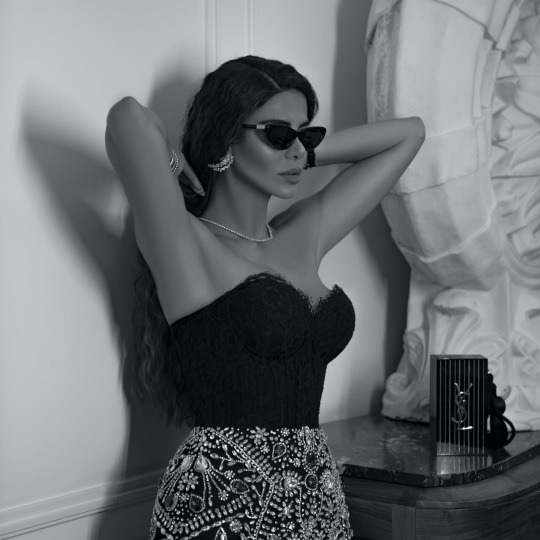
Dark feminine energy is a hot topic in 2024.
Since the arising popularity of the femininity wave, awareness of its shadow aspects – dark femininity – followed soon after. This is most noticeable through social media trends like TikTok blowing up with #darkfeminine content and tips, followed by even Vogue articles on this topic that holds such fascination for so many of us.
I believe all women can benefit from tapping into their dark feminine energy. However, I’ve noticed a common misconception about what the dark feminine is about, and many creators (businesses, sites, blogs) are perpetuating this misconception because the toxic angle is more profitable than the self improvement angle.
In short, they’re giving dark feminine energy a bad reputation by claiming it’s all about “using dark psychology tips and tricks to manipulate men, get into their heads and get them to treat you right”.
There are many problematic things with the above. Let’s name a few:
Why it’s problematic to associate DF to manipulation
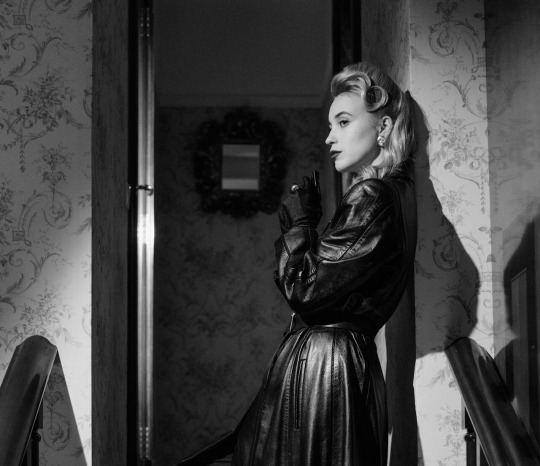
You can’t (and shouldn’t) waste your time persuading someone of your worth. It’s not your job to prove yourself. People either appreciate you, or they don’t.
I don’t recommend playing with dark psychology the same reason I don’t recommend playing with black magic. What goes around comes around. However, I support every woman’s freedom of choice, as long as you’re taking ownership for your actions.
It’s yet again male-centered. Instead of being about self improvement or self-discovery, it revolves around… yes, male validation.
Dark femininity is an incredibly empowering tool, and this misconception is leading a lot of girls and women to play games and chase men, instead of leading them into their own power.
A more accurate term for the above trend which revolves around revenge and manipulation is simply “toxic femininity” or the wounded feminine. Yes, the female equivalent of toxic masculinity, because mistakes can be made on either side.
There is nothing feminist or empowering in chasing an ex that mistreated you, and putting on an elaborate show just to convince him you were always his dreamgirl.
Understand that through this, you are giving away your power and relying on another person to validate your...
Read full article
#sk lumen#dark femininity#dark feminine energy#femme fatale#feminine archetypes#divine feminine#girlblogger#blog#female manipulator#dark psychology#dark femme#dark feminine
42 notes
·
View notes
Note
The Maw makes much more sense when you think of it as an extension of the lady. She strips the kids out of their individuality and makes them all look like as she transforms them into working drones.
In a way it paralells what she did to herself , doesn't it?
(From my very sane Lady post [×75])
Yes! This is exactly what I think, but most importantly, it goes both ways. The Maw is an extension of her, but the Lady is an extension of the Maw. She's the symbol that rappresents it and everything that comes with it -- for better and for worse. And there is very little "better" to be had in these circumstances, if none at all.
Honestly, even considering the issues she does have, ultimately she's the one that got the most lenient treatment. It depends on points of view of course - I don't know how bearing the generational curse would be an ideal living condition in any other setting - but considering she has a roof over her head, constant feeding and revenue as well as the fame all around the Nowhere (in all instances of visual storytelling in the franchise there is at least one reference to the Maw and/or to her), you can't say she got the short end of the stick. She's a lot better off than even other adults.
So with this in mind, and knowing that she is someone who is able to form these reasonings (I cannot stress enough how peculiar that she's the only one who seems to understand genuinely that something in the outside world is wrong), I suppose that weighing her options and choosing to live on the Maw was ultimately what she thought was the better choice. She wasn't wrong, necessarely. She did survive a long time: but what point is there in surviving if you lose what makes life worth living along the way? If you don't have yourself, why should you keep pressing on?
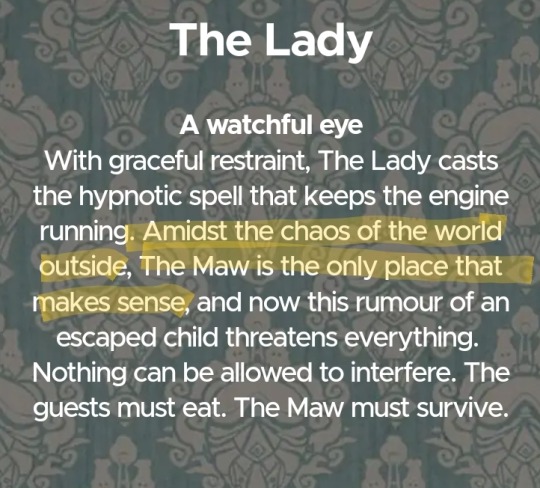
I think this reasoning is what led her to form this attachment to the Maw, to the point that eventually she died for it even though her primary objective was survival, at some point in the past. Probably.
Mervik confirming that the Maw has existed before her was, at least for me, even a further look into just how futile - and interesting - this mindset of hers is because at the end of the day, the Lady as a person is... disposable. The position isn't, but the individual is. The Maw existed long before her, and it will exist long after if Six decides to stay. It doesn't matter whether or not she sees it as her home because to the institution Maw, she's just another chess piece - as expendable as a pawn in spite of dressing the clothes of the queen, if you will.
Considering this... only adds insult to injury, don't you think? She lost herself to a place that did not care for her at all, in the grand scheme of things. She is to the Maw what children are to her: a parasite. A useful one to keep the system running, but ultimately destined to be eradicated and forgotten. Faceless and nameless. It's like she - the person - was never even there to begin with.
#little nightmares#the lady#ln meta#ln the lady#{im so passionate about her i find her so unique. in her writing#if you know other villains like her actually do tell because i am enamored with this kind of villain#she - like six - cant be fit in a singular box of character archetype. shes a cluster of character traits#i think she is just. lovely#i love complex female characters. tarsier studios... keep cooking.}
52 notes
·
View notes
Text
the lonely princess
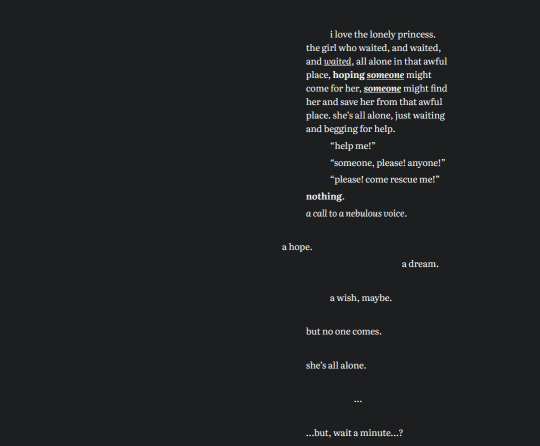


#slay the princess#princess trope#all princesses in waiting are the same princess at heart just waiting for their night#poetry#poetic writing#formatting poetry#experimental writing#fairytales#the princess and her prince#those voices are all the lives of different stories with different princesses finding their prince#rosamund du prix#rapunzel#sleeping beauty#any princess you can think of that is she#not just for female princesses either. i mean this as the archetype of The Princess#archetypes#embraceyourwriting#meta#meta writing
36 notes
·
View notes
Text
Ok but the parallel between Cersei absolutely terrorising the shit out of Littlefinger in the "Power is Power" scene and Alicent being sexually abused by Larys in order to get him to do what she wants is just.marvellous.
They are both Queen regents. That literally means they are like one of the 5 most powerful people in all seven kingdoms, not to say the most powerful people in all seven kingdoms after the king himself. They both happen to have a faithful servant/counselor that also happens to be a psychotic murderous piece of shit, no disagreement on that. Both these counselors try to exert power over the Queens but the Queens' reactions are totally not the same. Littlefinger tries to scare Cersei by saying that he knows everything that happens, implying that he can take her down at any moment. Larys terrorises Alicent by executing murder that she didn't order, but in her name, thus blackmailing her. Cersei kindly reminds Littlefinger that he can be the most powerful and unhinged Lord in all Seven Kingdoms but she is still the Queen, on top of that she is fucking insane and she will cut his throat on the spot if he defies her again. Alicent on the other hand has Larys masturbate to her feet so that hopefully he will do as she wishes. Alicent, the Queen regent. That could literally order his execution on the spot. He is a simple disabled Lord and she is the Queen and she needs to give him sexual favours so that he obeys her? What she could have done is negotiate, and blackmail back, in a power move that is worthy of real Queen regents in history who had political wit and ruthlessness and ambition. A power move that is worthy or book!Alicent herself. Imagine the dialogue and the character development that scene could have given us. But nope, wasn't meant to be. What we got instead is a disabled person being creepy and abusive and Alicent being a victim yet again.
And you are still wondering why this isn't an engaging character? You are still wondering why the general audience doesn't give a fuck about her?
#cersei Lannister#got#HotD#house of the dragon#got x hotd parallels#anti alicent hightower#you see why Cersei is superior guys?#not because she is a female evil archetype#but because she was the fucking BOSSS#aspa rambles
205 notes
·
View notes
Text
But independence is not the sole preserve of widows and singles. It can also occur in the home itself, right under a husband's nose. This is indeed the symbolism of the witch's nocturnal flights, which lead her to desert the marital bed, escaping the sleeping man's vigilance, to straddle her broomstick and take off for the sabbath. In the demonologists' tirades, which betray the masculine obsessions of their times, the witch's flight, as Armelle Le Bras-Chopard describes it, represents:
“a freedom to come and go, not only without the husband's permission but generally without his knowledge (unless he is a witch himself) and even to his disadvantage. By picking up a broomstick or chair leg and placing it between her legs, the witch awards herself a simulacrum of the virile member that she lacks. And by artificially stepping outside her sex and giving herself that of a man, she is also stepping outside her female gender: the witch is able to accord herself the ease of movement that, within the standard social order, is the unique privilege of men. [...] Granting herself this autonomy, and thereby escaping the man whose principal freedom is manifest through his dominance over her, the witch spirits a portion of the man's power away from him: her liberation is also a larceny.”
Contrary to what today's "backlash" would have us believe, women's autonomy does not entail a severing of connections, but rather the opportunity to form bonds that do not infringe on our integrity or our freedom of choice, bonds that promote our personal development instead of blocking it—whatever lifestyle we choose, whether solo or in a partnership, with or without children. As Pam Grossman writes, "the Witch is arguably the only female archetype that has power on its own terms. She is not defined by anyone else. Wife, sister, mother, virgin, whore—these archetypes draw meaning based on relationships with others. The Witch, however, is a woman who stands entirely on her own." Whereas the example promulgated over the period of the witch-hunts, imposed first by violence and then, later, with the nineteenth-century invention of the housewife ideal, by a clever mix of flattery, seduction and menace, locks women into their role as reproducers and disenfranchises them from participation in the world of work. Thus, women are positioned in such a way that their own identity is constantly at risk of being muddled with others,' of atrophying, of being swallowed up altogether. They are prevented from living and fashioning their own lives, for the sake of representing an imagined quintessence of femininity. In New York, in 1969, the WITCH group caused havoc at a weddings trade fair by releasing mice into the main hall. One of their slogans railed, "Always a Bride, Never a Person."
-Mona Chollet, In Defense of Witches: The Legacy of the Witch Hunts and Why Women are Still on Trial
22 notes
·
View notes
Text
blorbo archetype: annoying men who know they’re annoying and can’t stop so they weaponize it
#this post is brought to you by me remembering that fallen london exists#and how much I liked the Jovial Contrarian#and then thinking about the Riddler#and Silk from the Belgariad#i like them a normal amount#I also really like other characters slightly to the side of this archetype— lots of detectives can be this#but the focus is on how it works in their favor to solve the crime#whereas#these guys cause at least as many problems as they solve#similarly the secret hero who pretends to be a rich useless playboy#can turn it on and off when they want��� these guys can’t#tricksters 💙#anyways we also need more female characters like this#my posts
43 notes
·
View notes
Text
if i see one more person in the re tag try to claim that alex wesker is “accidentally implied to be trans” bc she mutates from the “women die but men mutate virus” i am going to start throwing bricks. y’all don’t know WHY the writers made that decision for the virus, is the fucking problem. the reason they write the virus like that is literally because people didn’t like shooting women in re4, so in 5 and rev2 they made all the unimportant body bag enemies men, and lazily threw in an in universe explanation that “uh actually the virus just kills women and children and mutates the men” and bc alex is the main boss of the game and the one overseeing the virus, narratively it makes sense for her to mutate bc of the virus you’ve been fighting all game. she’s not trans. and making a character who’s canonically a child abuser and has subtext that could be seen as csa into a trans woman isn’t fucking progressive, it’s transmisogyny that for once comes from the fans and not the writers of these games
#sid rants#sid bitches#transmisogyny#y’all do this with another female character of the same archetype too but if i bring her up i might get harassed again so 🤐
17 notes
·
View notes
Note
What does it mean to speak less when trying to seduce someone’. Can you provide a conference example of how it would look like? How should one act etc?
Hi love! I would say that this concept boils down to two main principles: Not offering any more information about yourself than absolutely necessary to continue the conversation (nothing too personal, keep it light), and remaining interested to be interesting.
Regarding not offering any more information about yourself than absolutely necessary to continue the conversation (nothing too personal, keep it light):
Keep the conversation on a more surface level; avoid any sensitive topics or emotionally-charged topics (like a breakup, toxic ex, strained family relationship, financial struggles, workplace drama, or job/career difficulties)
Focus on conversational topics you would pitch to a magazine, post on social media, or take a quiz on vs. something that would be better saved for a close friend chat or therapy session
On remaining interested to be interesting:
Ask questions before sharing information about yourself. Initiate a conversation with a question. Ask relevant follow-up questions as a response vs. offering to disclose an anecdote or personal information about yourself
Use their answers or shared stories as a way to frame your reply. Volley the conversation back to your conversation partner by paraphrasing what they just said to you to show that you were listening and sought to understand what they were saying. After paraphrasing, ask another question that dives deeper into an aspect of their shared story, opinion, recollection of an event, etc. As an example, if they were telling you about a work presentation, ask about how they felt before, after, or during, what it was about, why the presentation mattered, what their colleagues and bosses thought, the next steps, where it was held, what they had for lunch after, etc.
Hope this helps xx
#art of seduction#robert greene#seducteurs#charmer#archetypes#charismatic#behavior modification#character development#social interaction#socializing#social skills#conversation starters#oversharing#communication skills#dark feminine energy#dark femininity#femme fatale#it girl#the feminine urge#female excellence#dream girl#female power#queen energy#femmefatalevibe#q/a#high value woman
161 notes
·
View notes
Text
everything about hu tao feels like they brought in a guest to handle her, from her design to her writing
#i was talking about it in a discord server#she's the only female character in genshin that doesnt fit in to one of 3 boring generic character archetypes#and her character design is the only one that isnt overloaded with millions of unnecessary details#while being actually telling about her personality#how did they do that. how. how did they strike gold ONCE and then create garbage forever#bunny says...#hu tao#doing everything i can to justify wanting that hu tao figure
9 notes
·
View notes
